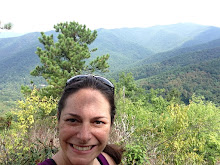 The most memorable part of the trip, for all of us, was definitely our homestay with families in rural northern Namibia. This is Owambo country, where tribal councils (see photo on left) and kings still mediate many disputes and make decisions. The modern and traditional co-exist here, with many of our host families living in a mixture of new cement buildings and stick-and-thatch huts within their family homestead.
The most memorable part of the trip, for all of us, was definitely our homestay with families in rural northern Namibia. This is Owambo country, where tribal councils (see photo on left) and kings still mediate many disputes and make decisions. The modern and traditional co-exist here, with many of our host families living in a mixture of new cement buildings and stick-and-thatch huts within their family homestead.
This is also a place where the African "culture of care" we had heard so much about came to life. Our guide, Paulos, had told us that long before we arrived our host families had been praying for us and preparing for our visit, and we found this to be obvious in the way they welcomed us, in the signs that my host mom had posted that said, "welcome my student daughters, feel at home," in the hand-woven basket one family made for my classmate Jason with his initials in it, in the devotion and prayers that my host mom had written out in English to read through with us on our first night with her. We were welcomed with a genuine and generous warmth, even though we were strangers.


We stayed in pairs with different families around the small town of Oniipa. Raven and I were adopted into Meme Martha's family, along with her 5 year old son and 9 year old niece (her husband works in a mine in a distant part of the country). We cooked with her, and she took pride in introducing us to Owambo culture, especially the foods - Mehangu porridge, black-eyed-pea-like beans, a fermented flour-based drink. We visited her mother's homestead, where  we watched the strong Namibian women pound Mehangu flour with ease (Raven and I were not quite so graceful wielding the heavy pounding stick), and where Kuku (grandmother) presented us with the light pink strands of beads worn by women of their tribe.
we watched the strong Namibian women pound Mehangu flour with ease (Raven and I were not quite so graceful wielding the heavy pounding stick), and where Kuku (grandmother) presented us with the light pink strands of beads worn by women of their tribe.
 we watched the strong Namibian women pound Mehangu flour with ease (Raven and I were not quite so graceful wielding the heavy pounding stick), and where Kuku (grandmother) presented us with the light pink strands of beads worn by women of their tribe.
we watched the strong Namibian women pound Mehangu flour with ease (Raven and I were not quite so graceful wielding the heavy pounding stick), and where Kuku (grandmother) presented us with the light pink strands of beads worn by women of their tribe. Throughout our time there, we could feel the powerful bonds of family and community which permeate the African lifestyle. When Meme Martha's brother and sister-in-law died, she took in her young niece. Neighbors came by to ask for or offer favors (like one who came to recharge her cell phone, since her own house doesn't have electricity). One of our speakers in Namibia told our group that even with such high unemployment and poverty, few people in the country starve because as long as one relative has an income, he or she will support any extended family members who are in need.
Meme Martha also gave me a great insight into our Western notions of hunger and abundance. She began asking me about traditional American foods, and whether we have many farms in the U.S. When I explained that the vast majority of people get their food from supermarkets, not from their own farm or garden, she was surprised. She was even more shocked to find out that we can't even go to a neighboring farm to buy a goat or cow. She then asked, "But what about people who don't have any money - how can they eat?" For a culture where even the poorest family grows Mehangu flour for porridge and bread, and where those without money can depend on relatives and neighbors for food, our Western system must seem pretty backwards.
I'm grateful that I was able to experience the abundant African hospitality and community for a few days in Oniipa.

No comments:
Post a Comment